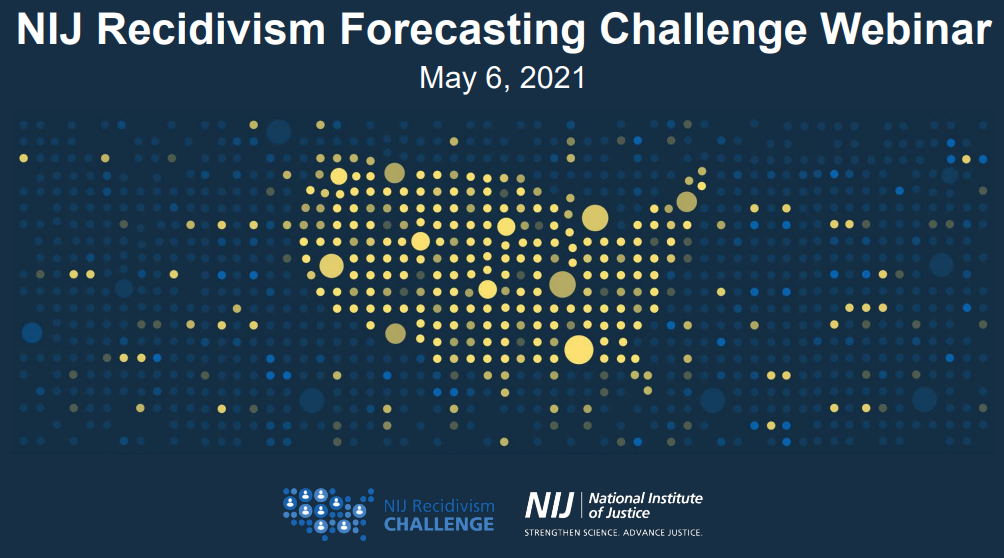University of Illinois
Domestic Terrorism Targeting America’s Political Elites
Remarks by the Honorable James K. Stewart to the Third Annual Symposium on Criminal Justice Issues at the University of Illinois on August 24, 1988
Building Trust Inside and Out The Challenge of Legitimacy Facing Police Leaders
In the face of budget cuts, changing workforce demands, new varieties of crime and new technologies, how should police executives manage officers and other personnel and still ensure that organizational goals are being met?
Drawing on new data from a national sample, Dr. Dennis Rosenbaum, Director of the Center for Research in Law and Justice at the University of Illinois, Chicago, discussed the latest findings...
NIJ Recidivism Forecasting Challenge Webinar Transcript
Challenge has closed
Thank you to everyone who submitted an entry. Winners will be notified by August 16, 2021, and posted online.
Winners are to submit paper outlining the variables that were tested, indicating which were of statistical significance and which were not, by September 17, 2021.
DARYL FOX: Good afternoon, everyone. Welcome to today's webinar. NIJ's Recidivism Forecasting Challenge, hosted...
What Does A Community-Based Organization Need To Successfully Implement A Public Health Approach To Preventing Violent Extremism?
Selective Incapacitation - An Assessment
Community Structure and Crime: Testing Social-Disorganization Theory
CeaseFire: A Public Health Approach to Reduce Shootings and Killings
Capillary Zone Electrophoresis Automated Fraction Collection for the Forensic Analysis of Sexual Assault Evidence
Real-Time Crime Forecasting Challenge Webinar
This webinar will offer a brief overview of the National Institute of Justice and the data science needs of the criminal justice field. In addition, it will provide details about the Crime Forecasting Challenge, including who can submit, how to retrieve datasets, and the submission categories. The overall goal of the Crime Forecasting Challenge is to harness recent advances in data science to drive innovation in algorithms that advance place-based crime forecasting.
See the YouTube Terms of Service and Google Privacy Policy
Violent Repeat Victimization: Prospects and Challenges for Research and Practice
Research tells us that a relatively small fraction of individuals experience a large proportion of violent victimizations. Thus, focusing on reducing repeat victimization might have a large impact on total rates of violence. However, research also tells us that most violent crime victims do not experience more than one incident during a six-month or one-year time period. As a result, special policies to prevent repeat violence may not be cost-effective for most victims.
See the YouTube Terms of Service and Google Privacy Policy
From the Academy to Retirement: A Journey Through the Policing Lifecycle
Professor Rosenbaum and a panel of colleagues discuss a study to demonstrate the feasibility of creating a foundation from which to launch studies about multiple aspects of policing using standardized definitions and measurement tools. Their goal is to advance knowledge about policing and translate data into evidence-based best practices that improve training, supervision and accountability systems. The effort is expected to produce a better understanding of what motivates police officers and makes them healthier, happier and more effective.
See the YouTube Terms of Service and Google Privacy Policy
Don't Jump the Shark: Understanding Deterrence and Legitimacy in the Architecture of Law Enforcement
Deterrence theory dominates the American understanding of how to regulate criminal behavior but social psychologists' research shows that people comply for reasons that have nothing to do with fear of punishment; they have to do with values, fair procedures and how people connect with one another. Professor Meares discussed the relevance of social psychologists' emerging theory to legal theory and practice and how deterrence and emerging social psychology theories intertwine.
See the YouTube Terms of Service and Google Privacy Policy
Homicide in the United States
The 2009 NIJ Conference kicked off with a blue-ribbon panel of leaders with expertise in urban issues as they relate to homicide. These experts will discuss promising approaches that have resulted in reduced violence and community empowerment.
Elder Abuse: How Much Occurs and How Do We Measure It?
NIJ Conference Panel
Panelists will present NIJ research on elder mistreatment in noninstitutionalized adults as well as tools for measuring the financial exploitation and psychological abuse of the elderly. A recently completed telephone survey of more than 6,500 older adults living in the community provides the most accurate estimates of the prevalence and incidence of physical, sexual, financial and emotional elder abuse. A second study used state-of-the-art science methods to develop a tool that measures the financial and psychological abuse of elders.
Chicago Ceasefire - Postplenary Session at the 2009 NIJ Conference
CeaseFire is an evidence-based, data-driven intervention designed to stop shootings and killings in high-incidence neighborhoods by directly intervening with those who are most likely to be involved in a shooting and by building support for alternatives to violence in those neighborhoods. Panel members will share their experiences “on the ground” mediating conflicts and working one-on-one with high-risk individuals.
Capillary Zone Electrophoresis Automated Fraction Collection for the Forensic Analysis of Sexual Assault Evidence
Capillary Zone Electrophoresis Automated Fraction Collection for the Forensic Analysis of Sexual Assault Evidence
Understanding Arrest Data in the National Incident-Based Reporting System (NIBRS)
Development of Modern Microcrystal Tests for Controlled Drugs, Diverted Pharmaceuticals and Bath Salts
Guilty Plea and Latino Initiatives
Building Trust Inside and Out: The Challenge of Legitimacy Facing Police Leaders


